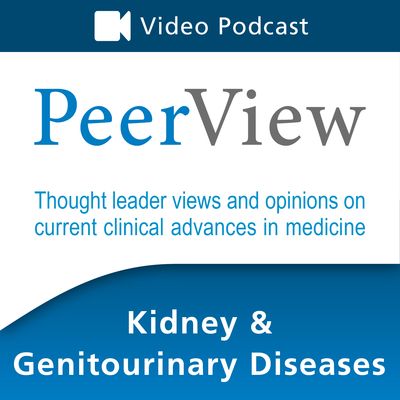PeerView (PVI) is a leading provider of high-quality, innovative continuing education (CME/CE/CPE and MOC) for clinicians and their interprofessional teams. Combining evidence-based medicine and instructional expertise, PeerView activities improve the knowledge, skills, and strategies that support clinical performance and patient outcomes. PeerView makes its educational programming and expert-led presentations and symposia available through its network of popular podcast channels to support specific specialties and conditions. Each episode includes a link to request CME/CE credit for participation. PeerView is solely responsible for the selection of topics, the preparation of editorial content, and the distribution of all materials it publishes.
http://ww2.peerview.com
Matthew R. Smith, MD, PhD - Expanding Use of Hormonal Therapeutic Strategies in Prostate Cancer: Clinical Evidence and Practical Considerations for Individualized, Patient-Centered Care
Go online to PeerView.com/PNF860 to view the activity, download slides and practice aids, and complete the post-test to earn credit. “Treatment intensification”—or the use of combination treatment strategies—has now become the standard of care for patients with metastatic hormone-sensitive prostate cancer. Shown to extend overall survival beyond single-agent treatment, these combinations of androgen deprivation therapy and other effective treatments such as docetaxel chemotherapy and/or novel androgen axis inhibitors have resulted in regulatory approvals and updates to clinical practice guidelines. Given the range of effective options and more on the horizon, as additional agents and combinations are also being studied in localized and advanced disease, how do clinicians ensure that the right patients are getting the right treatments? In this activity, based on a recent live symposium, expert faculty pair in-depth updates on efficacy and safety data on approved and emerging regimens with case-based discussion of best practices for bringing treatment advances to the clinic. Featured topics include individualizing care based on patient-, disease-, and treatment-related factors, toxicity management, and patient perspectives. Upon completion of this activity, participants should be better able to: Summarize the rationale and clinical evidence for established and emerging hormonal therapeutic approaches for patients with prostate cancer; Employ optimal, individualized treatment plans for patients with prostate cancer that incorporate established and emerging hormonal therapeutics, as appropriate, taking into consideration individual patient-, disease-, and treatment-related factors; and Apply evidence- and team-based strategies to proactively mitigate and manage treatment-related adverse events that may occur in patients with prostate cancer who are receiving established and emerging hormonal therapeutics as part of their care.
